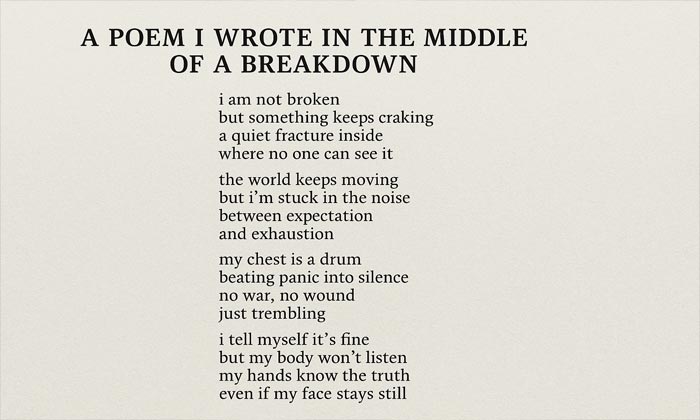Some things aren’t meant to be pretty. Not every moment comes wrapped in clarity, tied up with a bow of meaning. Sometimes, the only thing that makes sense is writing — not to be read, but to be released. This is what happens when thoughts get too loud, when the body shakes without warning, and when language becomes the only form of breathing left.
Breakdowns don’t always look dramatic. Often, they’re quiet, internal storms — invisible to everyone except the person trying to hold themselves together. In the middle of one, a poem came out. Not crafted, not edited, not planned. Just spilled. This isn’t about poetry in the literary sense — it’s about what words can do when logic fails and emotion demands to be witnessed.
When Feelings Refuse to Stay Quiet
There are moments when the mind caves in on itself. No particular reason. Or maybe too many reasons stacked on top of each other. That’s when hands shake, time slows down, and thoughts run in circles. What starts as anxiety turns into disorientation. Breathing feels artificial. Existing feels like an effort. Nothing feels stable — not even language.
But language becomes the only anchor. Even in incoherence, writing becomes a way to stay present, to survive the collapse. Not to fix it, not to analyze it — just to move through it. That’s what this poem was: a map made in real time while lost inside the mind.
The Poem
I am not broken
but something keeps cracking
a quiet fracture inside
where no one can see it
the world keeps moving
but I’m stuck in the noise
between expectation
and exhaustion
my chest is a drum
beating panic into silence
no war, no wound
just trembling
I tell myself it’s fine
but my body won’t listen
my hands know the truth
even if my face stays still
I want to be small
curl into the shape of nothing
fade without explanation
and rest without asking
but I write
because the words stay
when everything else leaves
and maybe
that’s enough for now
Why This Poem Mattered
There was no audience in mind when this poem came out. No intention. It wasn’t written for clarity or creativity — just for survival. The act of writing didn’t solve anything, but it softened the chaos. Gave the breakdown a place to land. Transformed intangible emotion into something visible. And sometimes, that’s the only thing needed — to see the storm in words and know it’s real.
Pain can feel ridiculous when it can’t be explained. When everything “looks fine” on the outside. That’s why creating during collapse matters. Not for art. For proof. That it happened. That it was endured. That the mind didn’t disappear completely. That somewhere, something was still reaching out — even if only in verse.
The Myth of Being “Put Together”
There’s a lie many carry: that falling apart makes someone weak. That the value of a person is tied to how composed they appear. That emotion should always come after logic. It’s a lie that hurts, because it teaches people to hide their realest moments — to mask breakdowns with silence and shame.
But collapse is human. It’s not a sign of failure — it’s the body and mind saying enough. And writing in that space isn’t performance. It’s permission. It’s choosing expression over suppression, even if it doesn’t make sense, even if the words are messy.
Turning Pain into Presence
It’s easy to ignore emotion until it screams. But when it does, when the noise is too loud to silence, putting it into words can create distance. Not detachment, but perspective. A way to say: I see this pain. I’m not running from it. But I’m also not letting it consume me.
1. Writing Is a Form of Grounding
Putting feelings into sentences — even broken ones — helps anchor them. It becomes a form of witness. A way to stay connected to self, even when everything feels scattered.
2. Emotions Don’t Need to Be Explained
Not everything has to be understood to be valid. Sometimes sadness just is. It doesn’t need to be justified. The poem doesn’t need to resolve anything — it only needs to be real.
3. Creative Expression Is Survival
Art is not always about making something beautiful. Sometimes it’s about making something bearable. A poem written in the middle of a breakdown isn’t for applause — it’s for breathing.
Conclusion
This isn’t a story with resolution. It’s not a triumphant tale of overcoming anxiety or reclaiming peace. It’s just a record of a moment. A crack in time, held together by words. And maybe that’s why it matters — because in a world obsessed with perfection, documenting the mess is revolutionary.
Breakdowns are rarely talked about honestly. But in the fragments, in the pages filled with panic, something else is born: truth. Not the filtered, digestible kind — but the raw kind that just is. This poem may not be perfect, but it was real. And in that moment, it was enough to hold the pieces together.
Topics #mental health #poetry #self-expression




